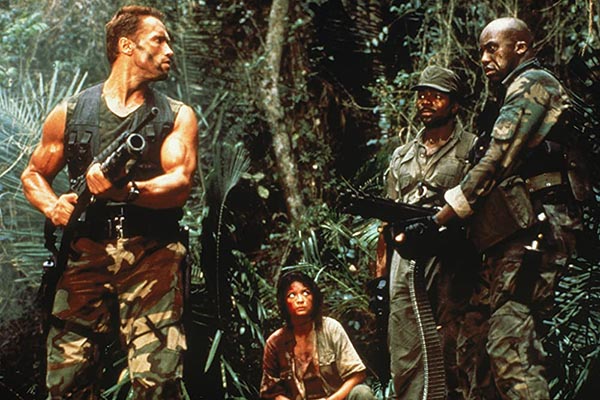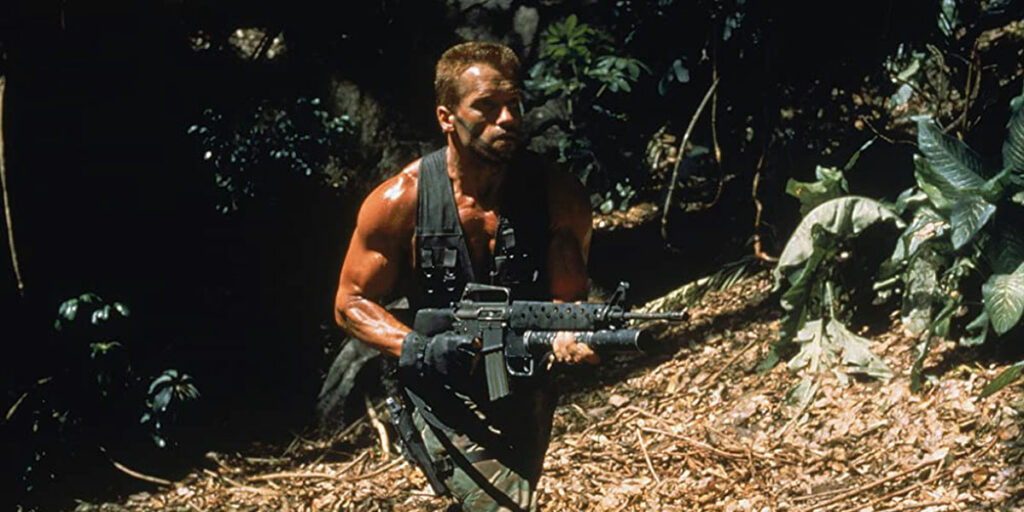Though it’s aged in a few areas, Predator holds up as an exciting action thriller with a subversive spin on masculinity that adds thought to its kills.
The Predator franchise has been beloved for over thirty years now. Fans have been treated to five films in total (which honestly feels like a low number in comparison to other long-running franchises), with the most recent one, Prey, having come out earlier this year. But the one that started it all is John McTeirnan’s 1987 action thriller Predator. Arnold Schwarzenegger stars as Dutch, who’s hired as part of a group of commandos to go on a rescue mission of fallen airmen in the Central American jungle. They think their biggest threats are the guerillas based in the location, but an alien – the titular predator – is hunting them, and he starts picking the crew off one by one. Dutch, his friend Dillon (Carl Weathers), and the increasingly few survivors must find a way to fight back and make it out of the jungle alive.
When Predator comes to mind, most people immediately think of the badass action, the awesome monster, and Arnold being his usual awkwardly loveable self. And yes, all of that is definitely present. Aside from the first big raid scene of the film, which is bafflingly shot with such obnoxious quick-cutting that I can’t even tell what’s going on half the time, the action is gritty, gory, and most of all, tense.
But Predator succeeds just as much as a thriller as it does an action film, if not more so. So much of that revolves around how much the predator himself is built up and how little of him you actually see for a while. Like Jaws and the Alien Xenomorph before him, the fear you feel for this monster comes as much from his actual capabilities as the sheer anticipation of knowing he’s out there but not knowing much about him or when he’s going to strike. The most you get for a while are POV shots as the predator stalks his prey, accompanied by the iconic heartbeat-like sound coming from his scanner. Even when he’s revealed and out in the open, the costume, prosthetics, Alan Silvestri’s dynamic score, and of course, McTiernan’s overall directing, turn him into a fully-realized beast that terrifies you any time he gets close. The final showdown with him is so perfectly paced and suspensefully shot, one of the best eighties action movie finales you’ll ever see.

With Predator being an eighties movie, though, some things have understandably not aged very gracefully. A lot of the visuals and effects hold up astonishingly well, with the standout again being the predator himself. But other shots look distractingly fake, like when an obviously fake head is blown off or when actors are supposed to be reacting to something but clearly can’t replicate the right response, because what’s happening in front of them isn’t real. The writing can be hit-and-miss too. I see so many people praise these characters, but outside of Dutch and Dillon, I find them either uninteresting, one-dimensional, or in the case of Shane Black’s character, annoying. This makes the first act of Predator a little bit of a slog on first viewing especially. But this is balanced out with better character beats elsewhere, such as the chemistry between Dutch and Dillon, and the presence of Anna (Elpidia Carrillo), a guerrilla taken by the team who adds some emotional weight to the situation. Arnold especially gets to shine in Predator, proving that, whatever you think of how “good” an actor he is, he has an infectious charisma and likeability that makes him a fun leading man. His performance is genuinely solid here, especially in his moments of crisis or fear.
But what really elevates Predator in my eyes from a good yet mindless action flick to a great movie worth thinking about is something that many may not even interpret as being in the film: its jabs at traditional, over-the-top masculinity. When Dutch and Dillon meet up early on, a handshake between them features a ridiculous shot of their comically massive biceps, and I remember being worried that the whole movie would be that same level of comically masculine (something I’ve never really been into). And for a good while, Predator does play into that expectation, with our “heroes” blowing everything away with no restraint and going overboard with their manly tendencies and personality traits. But when they take that same approach to attacking the predator, blindly firing endless rounds at him to absolutely no effect, it hit me what Predator is really going for.
The predator circumvents all of the guns-blazing, overly-macho attacks that worked when raiding the lair, and as a result, these tough, beefy guys are suddenly afraid, paranoid, and helpless. The predator, in turn, represents that same kind of excessive masculinity at its worst, deadliest extremes. He hunts for sport, collects trophies, and he’s a buff, animalistic creature despite being in possession of highly advanced tech. These traits and qualities are now being used against the kinds of people you could imagine having them. And in the final showdown, Dutch not only uses the predator’s thrill for the hunt against him, but he also relies on wit and cunning to get the drop on his foe. These recurring themes and motifs add a lot more intrigue to what initially seems like the type of hollow action you may expect going in. McTiernan isn’t even a stranger to this type of subversion. He did something similar with Die Hard by taking a tough-guy action hero and letting him be severely harmed and vulnerable, and he also addresses a lot of cheesy action tropes in Last Action Hero.
I think this is why Predator continues to be celebrated as a classic, whereas other films of its time and genre have largely fallen by the wayside. It gives viewers the insane, adrenaline-fueled action they’re likely looking for, while also turning it on its head to add a healthy amount of intelligence that rounds the entire experience out. I may not hold Predator in quite as high regard as its biggest fans, but I still consider it a great action film that’s worthy of being discussed and analyzed all these years later. It’s definitely aged in places and doesn’t fully deliver with a lot of characterizations, but it makes up for those issues by juggling thrills with thought in a really unique way that wasn’t even common back then and certainly isn’t now. I can’t speak for the Predator franchise as a whole, since I’ve only seen two other installments, but the 1987 original definitely holds up as an exciting action thriller in its own right.
Predator is now available to watch on digital and on demand, and to own on DVD and Blu-Ray. Read our review of Prey (2022).

